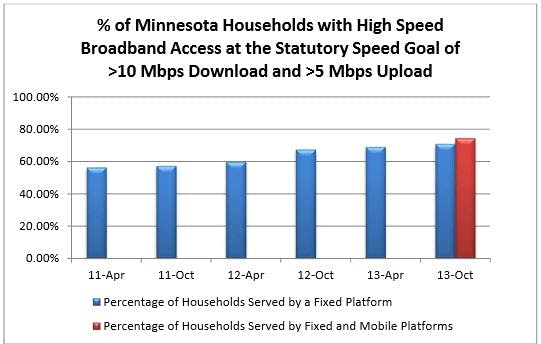State should put $100 million into broadband fund, says task force
Go Deeper.
Create an account or log in to save stories.
Like this?
Thanks for liking this story! We have added it to a list of your favorite stories.
Minnesota should put $100 million of its surplus into a fund to help pay for broadband infrastructure in parts of the state that now are poorly served, a state task force studying the issue is recommending.
The fund, envisioned as a matching-grant program to help public and private broadband providers, could deliver service to more than 100,000 households that are currently unserved or underserved, according to a report prepared by Gov. Mark Dayton's task force on broadband.
The recommendation is something of a departure from much prior discussion about high-speed Internet access in that it calls for spending state money to build infrastructure.
The Legislature in 2010 passed a law calling for every household in Minnesota to have good broadband access by 2015. To this point, legislators have followed up by creating the Office of Broadband Development in the Department of Employment and Economic Development. But they have not agreed to spend money on actual construction of fiber lines or other projects.
Turn Up Your Support
MPR News helps you turn down the noise and build shared understanding. Turn up your support for this public resource and keep trusted journalism accessible to all.

About three-quarters of Minnesota households have access to Internet speeds that the state considers adequate (10 megabits per second download and five megabits per second upload.)
The task force, headed by former House Speaker Margaret Anderson Kelliher, estimates that it would take between $900 million and $3.2 billion to get a wired broadband connection to everyone. The task force recommends a one-time appropriation to launch the fund and suggests that private and public partners match the money dollar for dollar. That would result in "well over 100,000 households receiving broadband service at the state speed goals." The task force is suggesting that the fund be overseen by the new broadband office created last year.
"The broadband access and adoption gap is significant in Minnesota," the report says, particularly in rural areas. For example, it says that while students have decent Internet access at school, in many areas they are unable to work online at home. The report also says that even in the Twin Cities there is an issue, not of availability but of many people being unable to afford service or not understanding its benefits.
The task force also recommends that the state:
Restore a sales tax exemption on some telecommunications equipment that was removed last year.
Pay to continue Internet mapping efforts in the state at a cost of $1.66 million over two years.
Create a fund to encourage Internet use and adoption. No dollar amount was included in the report.


